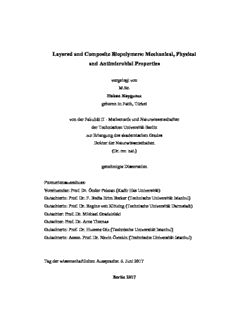
Layered and Composite Biopolymers: Mechanical, Physical and Antimicrobial Properties PDF
Preview Layered and Composite Biopolymers: Mechanical, Physical and Antimicrobial Properties
Layered and Composite Biopolymers: Mechanical, Physical and Antimicrobial Properties vorgelegt von M.Sc. Hakan Kaygusuz geboren in Fatih, Türkei von der Fakultät II - Mathematik und Naturwissenschaften der Technischen Universität Berlin zur Erlangung des akademischen Grades Doktor der Naturwissenschaften (Dr. rer. nat.) genehmigte Dissertation Promotionsausschuss: Vorsitzender: Prof. Dr. Önder Pekcan (Kadir Has Universität) Gutachterin: Prof. Dr. F. Bedia Erim Berker (Technische Universität Istanbul) Gutachterin: Prof. Dr. Regine von Klitzing (Technische Universität Darmstadt) Gutachter: Prof. Dr. Michael Gradzielski Gutachter: Prof. Dr. Arne Thomas Gutachterin: Prof. Dr. Huceste Giz (Technische Universität Istanbul) Gutachterin: Assoc. Prof. Dr. Nevin Öztekin (Technische Universität Istanbul) Tag der wissenschaftlichen Aussprache: 6. Juni 2017 Berlin 2017 To my family, FOREWORD I would like to express my gratitude to my supervisors, Prof. Dr. F. Bedia Erim Berker and Prof. Dr. Regine von Klitzing for giving me the opportunity to work in their research groups. I am grateful for their academic guidance and motivation. I thank Prof. Dr. Önder Pekcan, Prof. Dr. Michael Gradzielski, Prof. Dr. Arne Thomas, Prof. Dr. Huceste Giz and Assoc. Prof. Dr. Nevin Öztekin for evaluating this thesis. I also thank Dr. Gülşen Akın Evingür for her scientific support. I would like to thank Dr. Hakan Bildirir, Dr. Züleyha Yenice Campbell, Dr. Samantha Micciulla, Dr. Salomé Vargas Ruíz, Dr. Maximilan Zerball, Burcu Altın, Esra Oğuztürk, Dimitri Stehl, Sebastian Schön, Weina Wang, Ceyhun Yalçın, Dr. Tolga Müderrisoğlu, Thami Elboukhari, Ahmet Durmaz, Kerem Turhan, Zeynep Kalaycıoğlu, Nilay Kahya, Semira Bener, Sirun Özçelik, Dr. Ali Türkoğlu, Özgür Beyazıt and all other of my friends and colleagues in ITU Erim Lab and Stranski- Laboratorium TU Berlin for creating a pleasant atmosphere. I thank Lara Schäfer, Petra Erdmann, Maria Bülth and Fatih Şimşit for their help in bureaucratic paperwork. I would like to acknowledge the support from The Scientific and Technological Research Council of Turkey (TÜBİTAK) – BİDEB 2214/B joint doctoral scholarship programme. Finally, my special thanks go to my family, Üstün and Emel Kaygusuz for their love and support. March 2017 Hakan KAYGUSUZ TABLE OF CONTENTS Page FOREWORD…………………………………………………………………………………ix TABLE OF CONTENTS……………………………………………………….……….….viii ABBREVIATIONS AND SYMBOLS .................................................................................... x LIST OF TABLES ................................................................................................................. xii LIST OF FIGURES .............................................................................................................. xiv SUMMARY .......................................................................................................................... xviii ZUSAMMENFASSUNG ....................................................................................................... xx ÖZET ..................................................................................................................................... xxii 1. INTRODUCTION ............................................................................................................. 1 1.1 Motivation ............................................................................................................................... 1 1.2 Outline ..................................................................................................................................... 1 2 SCIENFITIC BACKGROUND ....................................................................................... 3 2.1 Chitosan ................................................................................................................................... 3 2.2 Alginate .................................................................................................................................... 4 2.2.1 Drug delivery ................................................................................................................... 7 2.2.2 Modeling of delivery ........................................................................................................ 8 2.2.3 Waste removal ................................................................................................................ 9 3 EFFECTS OF SURFACTANTS AND CROSSLINKERS ON MECHANICAL PROPERTIES OF ALGINATE HYDROGELS ................................................................. 11 3.1 Introduction ........................................................................................................................... 11 3.2 Materials and Methods ......................................................................................................... 12 3.2.1 Preparation of gel beads ............................................................................................... 12 3.2.2 Compression measurements ......................................................................................... 13 3.2.3 Calculations ................................................................................................................... 13 3.3 Results ................................................................................................................................... 14 3.4 Discussion .............................................................................................................................. 19 4 EFFECT OF ANIONIC SURFACTANT ON ALGINATE-CHITOSAN POLYELECTROLYTE MULTILAYERS .......................................................................... 22 4.1 Introduction ........................................................................................................................... 22 viii 4.2 Materials and Methods ......................................................................................................... 23 4.2.1 Preparation of polyelectrolyte multilayers ................................................................... 24 4.2.2 Characterization ............................................................................................................ 25 4.3 Results ................................................................................................................................... 30 4.4 Discussion .............................................................................................................................. 37 5 PREPARATION OF CERIUM ALGINATE–CHITOSAN FILMS AS POTENT WOUND DRESSING AGENTS ........................................................................................... 39 5.1 Introduction ........................................................................................................................... 39 5.2 Materials and Methods ......................................................................................................... 40 5.2.1 Preparation of the film samples .................................................................................... 40 5.2.2 Preparation of inoculums .............................................................................................. 42 5.2.3 Characterization ............................................................................................................ 42 5.2.4 Antibacterial activity ...................................................................................................... 44 5.3 Results and Discussion .......................................................................................................... 44 5.3.1 Characterization ............................................................................................................ 44 5.3.2 Antibacterial activities ................................................................................................... 47 6 BIBLIOGRAPHY ........................................................................................................... 49 APPENDICES ........................................................................................................................ 58 APPENDIX A: SUPPORTING INFORMATION FOR CHAPTER 3............................................................. 58 APPENDIX B: SUPPORTING INFORMATION FOR CHAPTER 4 ............................................................. 73 APPENDIX C: SUPPORTING INFORMATION FOR CHAPTER 5 ............................................................. 81 ix ABBREVIATIONS AND SYMBOLS Alg : Alginate Chi : Chitosan PEI : Polyethyleneimine SDS : Sodium dodecyl sulfate cmc : Critical micelle concentration LbL : Layer by layer PE : Polyelectrolyte PEM : Polyelectrolyte multilayer SR : Swelling ratio DL : Double layer F : Force C : Concentration t : Time f : Frequency m : Mass R : Radius H : Discplacement υ : Poisson’s ratio D : Dissipation x
Description: